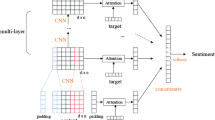Abstract
Targeted sentiment classification aims at determining the sentimental tendency towards specific targets. Most of the previous approaches model context and target words with RNN and attention. However, RNNs are difficult to parallelize and truncated backpropagation through time brings difficulty in remembering long-term patterns. To address this issue, this paper proposes an Attentional Encoder Network (AEN) which eschews recurrence and employs attention based encoders for the modeling between context and target. We raise the label unreliability issue and introduce label smoothing regularization. We also apply pre-trained BERT to this task and obtain new state-of-the-art results. Experiments and analysis demonstrate the effectiveness and lightweight of our model.
Access this chapter
Tax calculation will be finalised at checkout
Purchases are for personal use only
Similar content being viewed by others
Notes
- 1.
The detailed introduction of this task can be found at http://alt.qcri.org/semeval2014/task4.
- 2.
We use uncased BERT-base from https://github.com/google-research/bert.
- 3.
NVIDIA GTX 1080ti.
References
Bahdanau, D., Cho, K., Bengio, Y.: Neural machine translation by jointly learning to align and translate. arXiv preprint arXiv:1409.0473 (2014)
Chen, P., Sun, Z., Bing, L., Yang, W.: Recurrent attention network on memory for aspect sentiment analysis. In: Proceedings of the 2017 Conference on Empirical Methods in Natural Language Processing, pp. 452–461 (2017)
Devlin, J., Chang, M.W., Lee, K., Toutanova, K.: BERT: pre-training of deep bidirectional transformers for language understanding. arXiv preprint arXiv:1810.04805 (2018)
Ding, X., Liu, B., Yu, P.S.: A holistic lexicon-based approach to opinion mining. In: Proceedings of the 2008 International Conference on Web Search and Data Mining, pp. 231–240. ACM (2008)
Dong, L., Wei, F., Tan, C., Tang, D., Zhou, M., Xu, K.: Adaptive recursive neural network for target-dependent twitter sentiment classification. In: Proceedings of the 52nd Annual Meeting of the Association for Computational Linguistics (Volume 2: Short Papers), vol. 2, pp. 49–54 (2014)
Glorot, X., Bengio, Y.: Understanding the difficulty of training deep feedforward neural networks. In: Proceedings of the Thirteenth International Conference on Artificial Intelligence and Statistics, pp. 249–256 (2010)
Jiang, L., Yu, M., Zhou, M., Liu, X., Zhao, T.: Target-dependent twitter sentiment classification. In: Proceedings of the 49th Annual Meeting of the Association for Computational Linguistics: Human Language Technologies-Volume 1, pp. 151–160. Association for Computational Linguistics (2011)
Kingma, D.P., Ba, J.: Adam: a method for stochastic optimization. arXiv preprint arXiv:1412.6980 (2014)
Kiritchenko, S., Zhu, X., Cherry, C., Mohammad, S.: NRC-Canada-2014: detecting aspects and sentiment in customer reviews. In: Proceedings of the 8th International Workshop on Semantic Evaluation (SemEval 2014), pp. 437–442 (2014)
Li, X., Bing, L., Lam, W., Shi, B.: Transformation networks for target-oriented sentiment classification. In: Proceedings of the 56th Annual Meeting of the Association for Computational Linguistics (Volume 1: Long Papers), vol. 1, pp. 946–956 (2018)
Ma, D., Li, S., Zhang, X., Wang, H.: Interactive attention networks for aspect-level sentiment classification. In: Proceedings of the 26th International Joint Conference on Artificial Intelligence, pp. 4068–4074. AAAI Press (2017)
Pennington, J., Socher, R., Manning, C.: GloVe: global vectors for word representation. In: Proceedings of the 2014 Conference on Empirical Methods in Natural Language Processing (EMNLP), pp. 1532–1543 (2014)
Pontiki, M., Galanis, D., Pavlopoulos, J., Papageorgiou, H., Androutsopoulos, I., Manandhar, S.: SemEval-2014 task 4: aspect based sentiment analysis. In: Proceedings of the 8th International Workshop on Semantic Evaluation (SemEval 2014), pp. 27–35 (2014)
Rao, D., Ravichandran, D.: Semi-supervised polarity lexicon induction. In: Proceedings of the 12th Conference of the European Chapter of the Association for Computational Linguistics, pp. 675–682. Association for Computational Linguistics (2009)
Szegedy, C., Vanhoucke, V., Ioffe, S., Shlens, J., Wojna, Z.: Rethinking the inception architecture for computer vision. In: Proceedings of the IEEE Conference on Computer Vision and Pattern Recognition, pp. 2818–2826 (2016)
Tang, D., Qin, B., Feng, X., Liu, T.: Effective LSTMs for target-dependent sentiment classification. In: Proceedings of COLING 2016, the 26th International Conference on Computational Linguistics: Technical Papers, pp. 3298–3307 (2016)
Tang, D., Qin, B., Liu, T.: Aspect level sentiment classification with deep memory network. In: Proceedings of the 2016 Conference on Empirical Methods in Natural Language Processing, pp. 214–224 (2016)
Vaswani, A., et al.: Attention is all you need. In: Advances in Neural Information Processing Systems, pp. 5998–6008 (2017)
Wang, Y., Huang, M., Zhao, L., et al.: Attention-based LSTM for aspect-level sentiment classification. In: Proceedings of the 2016 Conference on Empirical Methods in Natural Language Processing, pp. 606–615 (2016)
Werbos, P.J.: Backpropagation through time: what it does and how to do it. Proc. IEEE 78(10), 1550–1560 (1990)
Acknowledgement
This work is supported by the National Natural Science Foundation of China (61673403, U1611262).
Author information
Authors and Affiliations
Corresponding author
Editor information
Editors and Affiliations
Rights and permissions
Copyright information
© 2019 Springer Nature Switzerland AG
About this paper
Cite this paper
Song, Y., Wang, J., Jiang, T., Liu, Z., Rao, Y. (2019). Targeted Sentiment Classification with Attentional Encoder Network. In: Tetko, I., Kůrková, V., Karpov, P., Theis, F. (eds) Artificial Neural Networks and Machine Learning – ICANN 2019: Text and Time Series. ICANN 2019. Lecture Notes in Computer Science(), vol 11730. Springer, Cham. https://doi.org/10.1007/978-3-030-30490-4_9
Download citation
DOI: https://doi.org/10.1007/978-3-030-30490-4_9
Published:
Publisher Name: Springer, Cham
Print ISBN: 978-3-030-30489-8
Online ISBN: 978-3-030-30490-4
eBook Packages: Computer ScienceComputer Science (R0)




